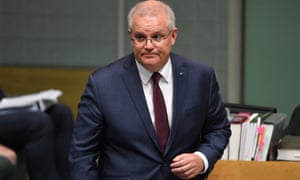Extract from The Guardian
As Australia worries about the growing influence of China, we need the help of Europe and the US more than ever
Political pressure makes the impossible inevitable. Unfortunately, so much has been written about how democracy is broken, that it can seem churlish to point out that sometimes it works just as it is designed to: slowly, imperfectly and then suddenly. Take, for example, Scott Morrison’s backflip on using so-called “carryover credits” to meet Australia’s Paris climate commitments.
In 2018 Richie Merzian, who is both the head of the Australia Institute’s climate and energy program and a former Australian diplomat, was the first to bell the cat on the Morrison government’s plan to rely on accounting tricks rather than make actual emission reductions.
The whole idea of carryover credits is as complicated as it is dodgy. The term wasn’t even used in the Paris agreement and, to put it crudely, the scam proposed by the government was tantamount to a drunk guy waving an expired Starbucks coffee voucher around in a McDonald’s and acting surprised that nobody wanted to give him a coffee.
More technically, the Australian government was trying to argue to the rest of the world that, because we had done such a good job of “exceeding” our Kyoto emission reduction targets, we should get carryover credits – avoiding the pesky need to actually reduce emissions to meet our Paris target. Australia’s position was so outrageous, not even other “overachievers” like the UK or Germany backed us, instead cancelling their own credits.
The only reason Australia managed to exceed its Kyoto commitments in the first place is that, back in 1997, John Howard and his environment minister Robert Hill refused to join the rest of the world and sign the Kyoto protocol – unless our emission “reduction” target allowed Australia to increase our emissions.
"The ability to ignore other countries’ requests for more climate ambition is quickly evaporating"
Yep, you read that right. While the European Union and US promised to cut their emissions by 8% and 7% respectively, Australia insisted it be allowed to increase emissions by 8%. Given that global climate agreements are based on consensus, Australia secured not only a soft target, but also a name for itself as a blocker of serious global action to reduce emissions.
Soon after Australia’s “win” in Kyoto, an anonymous observer of the negotiations wrote a paper for the Australia Institute which concluded: “There is not the slightest evidence that other countries accepted the key contention of the government, that the cost of uniform targets would be unfairly high for Australia. How then did Australia win concessions if its arguments carried no weight internationally … it is apparent that Australia won concessions by threatening to withdraw from the convention if its demands were not met.”
While that paper was published 22 years ago, Australia’s obstructive role in international climate talks has remained largely unchanged since – but our threats and tantrums have become less effective.
When the G20 met in Brisbane in 2014, then prime minister Tony Abbott declared that climate change would not be on the agenda. Rather than provide Abbott with the public spat he clearly wanted, then US president Barack Obama simply stopped off in China on the way to Brisbane to announce an ambitious joint plan to reduce emissions. Obama also gave a speech in Brisbane to hundreds of students, in which he mocked the idea that coal was essential to help lift people out of poverty. It’s easy to leave climate change off the agenda – but a lot harder to force the leader of the free world to follow suit.
In the lead-up to the 2015 United Nations climate change conference in Paris, Australia was systematically criticised by our Pacific Island neighbours for our determination to build enormous new coalmines and double our coal exports. Many of those same countries are now leading the charge for a global nonproliferation treaty for fossil fuels.
But despite requests from the Pacific, Australian ministers have repeatedly added insult to injury. Remember when Peter Dutton laughed about the impact of rising sea levels on our nearest neighbours? And yet those same ministers worry about the growing influence of China in our diplomatic backyard.
Which brings me back to the dodgy carryover credits. Since floating the idea that Australia would rely on carryover credits rather than actual reductions in carbon pollution, the Morrison government has faced significant pressure both here in Australia and on the world stage. Until last month, that pressure appeared to have as little impact on Australia’s negotiating position as the condemnation of our Pacific neighbours, or the contempt of Obama did.
But times change.
The thing foreign government diplomats in Canberra most struggle to understand is Australia’s climate position. Australia is desperately seeking the help of Europe and the US in our diplomatic standoff with China, and the ability to ignore other countries’ requests for more climate ambition is quickly evaporating. Now that Mathias Cormann wants to be the secretary of the OECD, he can see first-hand what the impact of Australia’s contemptuous approach to climate diplomacy really is. And if Australia wants to counter the growing influence of China in the Pacific, it’s obvious we will have to show our neighbours some respect.
For 30 years Australia has proudly been out on its own, leading the diplomatic charge against an ambitious global climate policy. But now that China has put us into diplomatic and trade precarity, the last thing that Australia wants is to be out on its own.
• Richard Denniss is the chief economist at independent thinktank The Australia Institute @RDNS_TAI

No comments:
Post a Comment